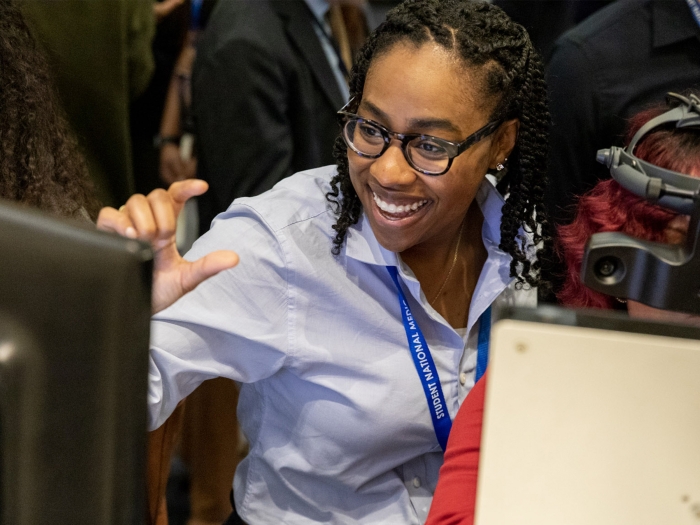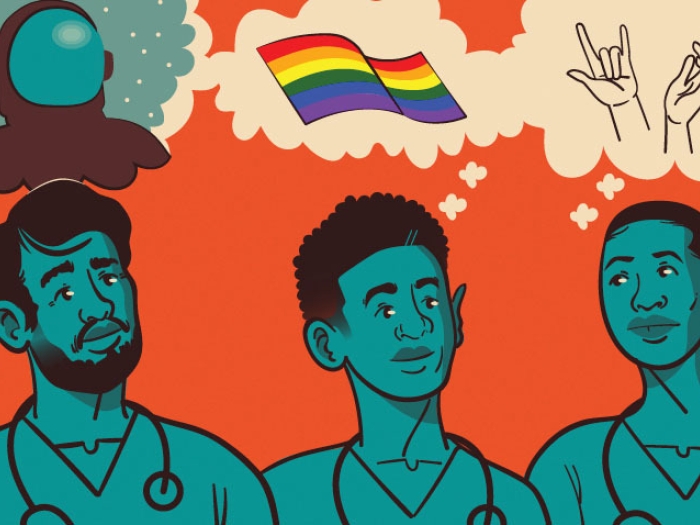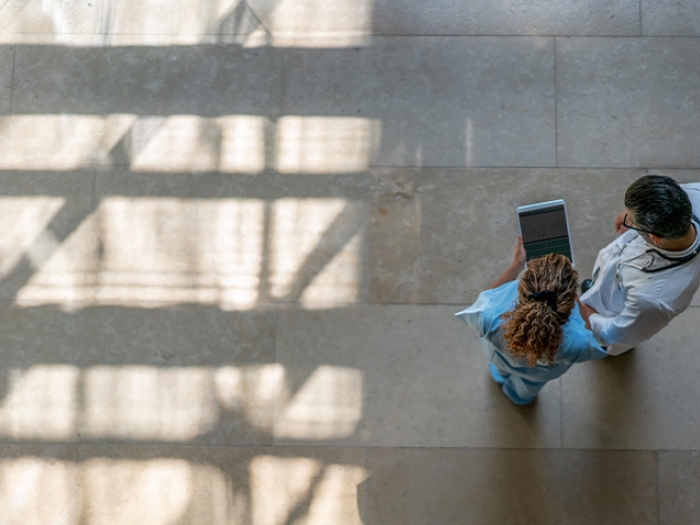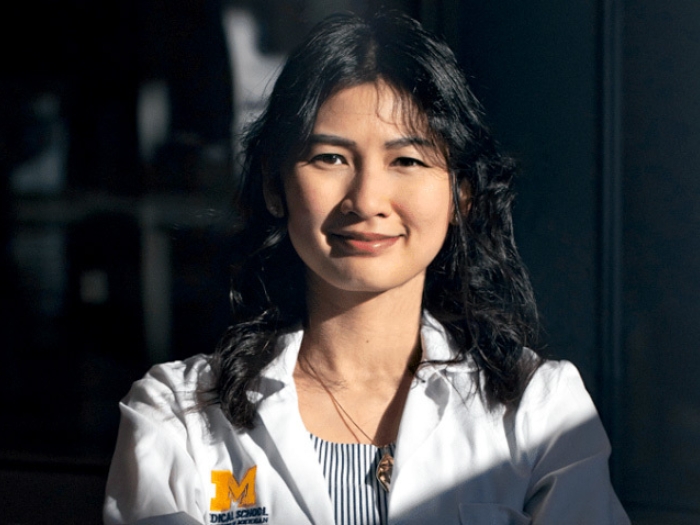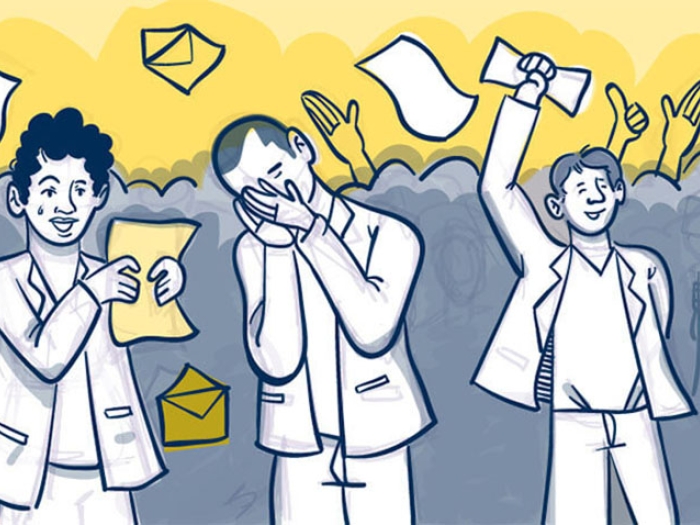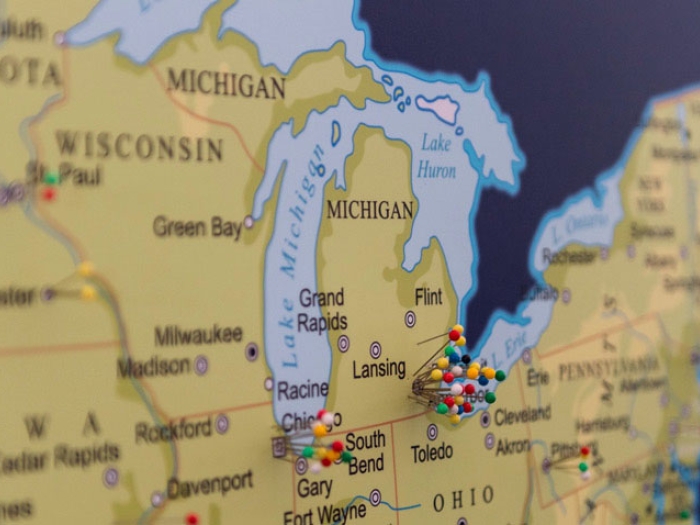Michigan Medicine faculty members recount their own Match Day experiences and share their advice for U-M’s Medical School Class of 2019.
7:00 AM
Author |

Match Day, an event that defines the career path for most soon-to-be medical school graduates, is finally here.
Each March, thousands of medical students across the country discover the location of their residency programs. And while many assume the occasion is instantly joyous for all, that's not always the case.
In the spirit of authenticity, Michigan Medicine faculty members recount their own diverse experiences with Match Day and offer advice to emerging physicians.
Rachel Glick, M.D.
Glick recounts matching at her second choice but in the wrong specialty:
"I matched at my second-choice internal medicine program and was heading to New York City, where I'd wanted to live. Sounds great, right? The problem was that over the next couple of years, I realized I'd chosen the wrong specialty.
I'd entered medical school thinking I would go into psychiatry. I had loved most of my clerkships and by senior year was trying to decide between internal medicine, obstetrics and gynecology, and psychiatry. I chose medicine and thought I'd never look back. But as a senior medical resident, I knew I didn't want to practice general internal medicine. And there was no subspecialty I loved enough to pursue.
I looked around the hospital and decided the job I wanted was that of a social worker. They were allowed to get to know patients and their families, understand them as people and in a way that I craved. I told my colleagues I was going to get my MSW. Several asked me if I had ever thought of psychiatry. Suddenly I remembered how close to choosing psychiatry I had come.
My medical school CV was less important than the fact that I was completing an internal medicine program successfully. So remember, even the outcome of the match is not irrevocable. People sometimes end up in a very different place than they thought they would be when they open their envelopes. Things will work out!"
Margaret L. Dobson, M.D.
Dobson "couple-couple" matched, an unanticipated gift:
"I was part of a couples match, which was its own sort of complicated relationship therapy and values clarification. We interviewed, sometimes in concert and sometimes across the country.
When we opened our envelope, a shock. A real stunner.
Our dear friends opened their envelope. They'd matched to the same city! The only common match on all four lists.
We had effectively 'couple-couple' matched. They became our people, our family away from home: weekly dinners with complicated menus from new cookbooks, simple pancake suppers, game nights, chicken soup when sick, camping and hiking, long walks in the snow and rain. We also simultaneously processed difficult patients and parenting challenges together.
Through the strain of residency, we provided each other with refuge. We kept reminding ourselves that before all of this, we were something other than doctors: We were friends, partners, daughters, sisters, sons. Vulnerable and imperfect.
We moved away to first jobs and fellowships. The dinners faded. But they remain our people. When they moved again, we drove to them and helped set up their kitchen. They schedule flights a day early to see us before Michigan family visits.
Now we're in Ann Arbor, and they're in San Francisco. We see them only two or three times a year. My heart aches a little missing them. But I am so grateful for the unanticipated gift that came from a complicated match."
Eric Skye, M.D.
As a military student, Skye had a different timeline than his peers:
"As a military student, I assumed that I would end up in a military residency, but there are no guarantees. I rotated at my preferred program but couldn't participate in any interviews because of my role in the military. So I scheduled 'civilian' interviews for January, just in case the military didn't place me.
Although there were eight military programs I could be drafted into, I could only rotate at one. While I was hoping for the best, I had no idea what the other programs were even like. In December, I learned that I would be sent to the program I had hoped for. I was excited but very nervous about moving to California with no friends or family within a thousand miles.
Moving to California turned out to be one of the highlights of my educational years. My residency classmates are still some of my greatest friends, and we keep in touch despite being all over the country. Although my match was fairly random, it turned out to be an incredible opportunity to grow into the physician I had always hoped to be."
Jocelyn Schiller, M.D.
Schiller was so shocked when she opened her envelope on Match Day that she dropped it on the stage:
"I struggled for about a month with my rank list. There were four programs I liked and all for different reasons.
Do I prioritize the program that lets me live near my sisters, even though I was intimidated by that program's patient volume and autonomy?
Do I prioritize my hometown, even though I wasn't as impressed with the program but my mom offered to let my husband and I live in her basement?
Then there was the University of Michigan, which was the program that I felt the most comfortable with, as well as the place where my husband would have the most support during my long residency days. But Michigan was really far away from our West Coast home.
So every day I readjusted my rank list until finally, I just entered it into ERAS and let it be. Once it was entered, I felt a sense of peace and was able to finally let it go.
On Match Day, I felt fairly confident that I was going to match at my No. 2 choice, which happened to be in my hometown. Before the event, the program director sent me a positive email, and back then almost everyone opened their match envelope on stage.
I opened mine … and to my surprise, I didn't match there! I was so shocked, I dropped my letter and wandered back to my seat. It took me 10 full minutes to adjust.
Yet now, I am thankful that I didn't match at the program that scared me. And I'm thankful I didn't have to live in my parents' basement. In fact, I now feel that residency is what you make of it. You could go to the 'top' program in the country, whatever that means, but be unmotivated or dislike it and barely cruise through.
Or you could go to a 'lower'-tier program, whatever that means, and be motivated, engaged in patient care and learning, and also come out a fantastic doctor.
Because I am a person of faith, I truly felt that I matched at the place I was meant to be. And you will too."

Explore a variety of health care news & stories by visiting the Health Lab home page for more articles.

Department of Communication at Michigan Medicine
Want top health & research news weekly? Sign up for Health Lab’s newsletters today!
